As business travelers return to the road and skies after a lengthy pandemic-induced hiatus, travel will be a bit different than they remember from pre-COVID-19. While the majority of business travelers say they are ready and willing to restart travel, many have questions about the new travel landscape and how to best navigate it. This article will outline what has changed and what you can expect so you can have peace of mind when you travel.
Longer Wait Times
Lines and waiting times when you are traveling boil down to the most basic premise of economics – supply and demand. After a nearly complete cessation of global travel in March 2020, many companies reduced staff (supply). This happened across the travel industry with restaurant servers, TSA security, and hotel housekeeping staff. Then, with vaccine rollouts and stringent safety protocols in place, people began traveling again (demand). Unfortunately, due to a lack of available financing or manpower, many businesses have not yet been able to ramp up their staffing, so for the immediate future, be prepared for extended wait times.
Travel Maestro’s suggestions for easing the stress of this frustration factor at the airport:
- Allow plenty of time to park, check-in, and get to your gate.
- If you don’t have a Trusted Traveler program for fast-track airport security, sign up ASAP.
- Don’t count on grabbing a bite at the airport. Take snacks and an empty water bottle in your carry-on bag. (Fill your bottle after you clear security.) Many airport food outlets operate shorter hours or are understaffed, so lines may be too long to wait before your flight.
- Pack an extra dose of patience and understand other travelers, as well as service staff are dealing with the same issues.
Our trip was wonderful! Yes, it is different traveling now but far from unpleasant and I think it’s a terrific time to visit Europe—no long lines of tour groups and everyone is extremely happy to have visitors and customers once again. We encountered nothing but unfailingly polite people everywhere. You do, however, need to stay on top of the COVID restrictions, especially the timing of your PCR test that is required to re-enter the U.S. We did ours in Munich on a Monday, and because it wasn’t possible to get the test on Sunday, we had to pay 140 Euros each for “express” results. Everything was done online to reserve and pay for the test (which took about three seconds) and we received the results online. We had the results printed out at the hotel just to be on the safe side. At the airport, there was a family in front of us who didn’t know about the required negative COVID test and had to do the same thing at the airport for even more money, not to mention the stress of trying to beat the clock and make the flight. In Austria, we had to show our vaccination cards and IDs plus wear N95 masks to the concerts we attended. At each restaurant, we wore a mask when we entered but once seated, masks came off. We showed our vax document at each venue and filled out paperwork at each restaurant where we ate. Some stores required masks to enter and shop, others did not. Germany was much stricter about the masks, and they had to be N95s, not surgical. It all sounds dramatic but once you got used to the routine it was just a tiny detail. Airports in Europe were on the empty side. We will never get such fantastic seats at concerts ever again!
Elizabeth Locke, Owner, Elizabeth Locke Jewelry
Emerging technology aids post-pandemic business travel.
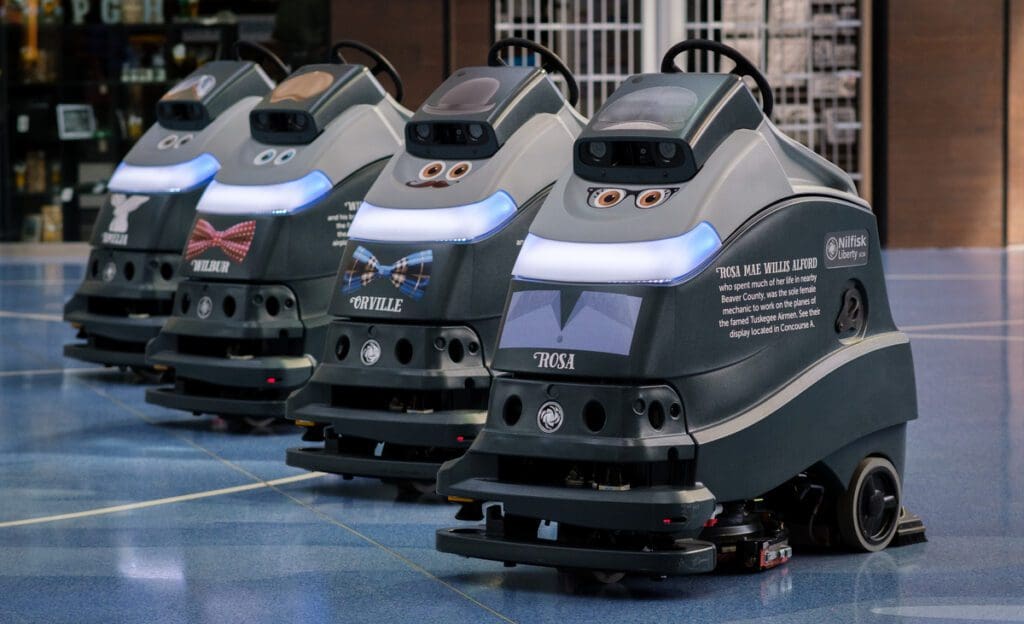
Disinfecting of public venues has taken center stage during the pandemic and fewer places are more public than an airport. Ultraviolet C (UV-C) technology was quickly put to use by airlines to disinfect planes between flights and many airports use it, too. Pittsburgh International Airport took the technology one step further. It has four battery-powered robots (named for four flying heroes: Amelia, Orville, Wilbur, and Rose Collins, the first female aviator license in Pennsylvania in 1929) that roam the airport cleaning for eight to ten hours per charge. Be sure to say hello if you meet one!
Non-contact technology, such as facial recognition tools, was introduced before the pandemic to speed up boarding but has the bonus of reducing virus transmission. Expect more biometrics to appear in the future at self-service kiosks, bag drop-offs, and gates so that physical interactions can be reduced.
Every frequent traveler has their favorite mobile apps, and you can expect their use in travel to expand. While apps are useful for checking in, getting boarding passes, and paying for checked bags, mobile alerts can manage hovering crowds at boarding gates by signaling individual boarding times. These apps help travelers practice safe social distancing and reduce touchpoints. Several digital health passports are also in development, allowing travelers to carry their vaccination and testing records with them digitally.
Vaccination and Testing Requirements
Government restrictions are most definitely a hurdle to travel at the moment. They are not insurmountable, but you must meet the local requirements or risk being turned away. To throw a wrench in it, the rules change frequently, so it is your responsibility to know the current standard. Travel Maestro tip: BCD Travel maintains an updated database with global entry restrictions.
- To fly within the U.S., full vaccination is not mandatory. Individual states (currently) allow proof of a negative COVID-19 test as an alternate.
- Many other countries require a mandatory quarantine period; some waive that with proof of full vaccination. Some reduce quarantine time until a negative test result is obtained.
- Museums, restaurants, and other indoor venues are beginning to require proof of vaccination, a trend that will likely grow as vaccines obtain full approval.
Returning to the U.S. From Abroad
All air passengers entering the U.S., including fully vaccinated people, must have proof of a negative COVID-19 test (PCR or antigen test) conducted within the three days before departure or documentation of recovery from COVID-19 within the past three months. The CDC also recommends that you get tested 3-5 days after travel, as international travel poses additional risks.
If you are arriving in Virginia after international travel, the Virginia Department of Health (VDH) will call you to check in on your health and provide information about staying safe after travel. Expect to receive a call with the Caller ID “VDH” or “VA Dept Health.” It is important that you answer this call to help limit the spread of COVID-19. Health department staff will ask you about potential exposures, any symptoms you may have, and your vaccination status. They will provide you with recommendations and resources for testing, quarantining (staying home), and other precautions based on your answers. VDH will also ask to set up daily check-ins by email, text, or phone call to monitor your health for 14 days after international travel. Any information you share with health department staff will remain confidential to protect and respect your privacy.
Changes in Airline Policies
Airline policies are quite dynamic. One major difference compared to pre-pandemic flying is that masks are mandatory in the airport and on the plane. Also, since many routes are still operating with reduced capacity and large numbers of people returned to the air, you can expect full flights.
Earlier this year, a welcome change occurred. Most carriers dropped changed fees for all domestic tickets or international travel beginning in the U.S. Of particular concern to frequent business travelers is keeping track of unused ticket credits. Any unused ticket booked through Covington (with an agent or online) is tracked and saved. We will advise you when you have a ticket that can be applied to a new reservation and reporting is available at the company level.
I flew from Washington Dulles to Las Vegas on Delta last week with a connection in Detroit each way. All four flights were completely full, including middle seats. Many announcements were made regarding masking at the airports and on planes. We were also advised that masks MUST be put up in between bites and sips. TSA lines were reasonable, but we arrived three hours prior to departure each way so we had a very comfortable experience with regards to stress. We used the Delta lounges, which is so much nicer than the open airport seating. The food courts and many stores (not all) are back open. There is 100% masking in Nevada right now. Casinos and restaurants were busy. We went to one show, Blue Man Group, and it was about 80% full on a Thursday night. We did get a rental car booked far in advance. I HIGHLY recommend folks sign up for frequent renter programs even if they will never rent again. It saved us from standing in a very long line.
Donna Loftus, International Business Travel Advisor
Corporate Sustainability & Individual Responsibility
The pandemic has compelled an increase in inner reflection among many of us, both individually and corporately. Collectively, we have elevated our focus on environmental sustainability and the global climate crisis. In a study conducted by IBM Institute for Business Value, 82 percent of consumers surveyed globally would choose a more environmentally friendly transportation option even if it costs more.
Suzanne Neufang, Executive Director of the Global Business Travel Association (GBTA), said the group has been emphasizing “the right travel in the right way.” She said some companies are linking their business travel comeback to new sustainability goals — for example, cutting back on single-day jaunts in favor of fewer but longer trips. While there is no denying the value of face-to-face meetings, business travelers might plan more appointments during a week-long stay instead of making multiple flights.
Companies can also influence their collective carbon footprint by incorporating sustainability into their travel policy. Covington Account Services is happy to offer guidelines and assistance.
Simple sustainability efforts for the individual business traveler include:
- Don’t print your travel documents; use a mobile app.
- In Europe, consider using lower carbon output trains rather than short flights.
- Rent electric vehicles when possible or use public transportation to lessen carbon emissions.
- Book eco-friendly hotels.
- Eat local; support restaurants that source meat and produce from local farms.
- Reduce your own use of single-use plastics, to-go meals, and disposable packaging.
Covington is here to help manage post-pandemic business travel.
Indeed, the pandemic has changed many aspects of business travel, but travel remains an invaluable part of doing business. The Covington team of travel consultants and corporate account managers is at your service to keep you up to date and help you get where you are going (and home again!) without surprises. When you need us, we are only a click away.

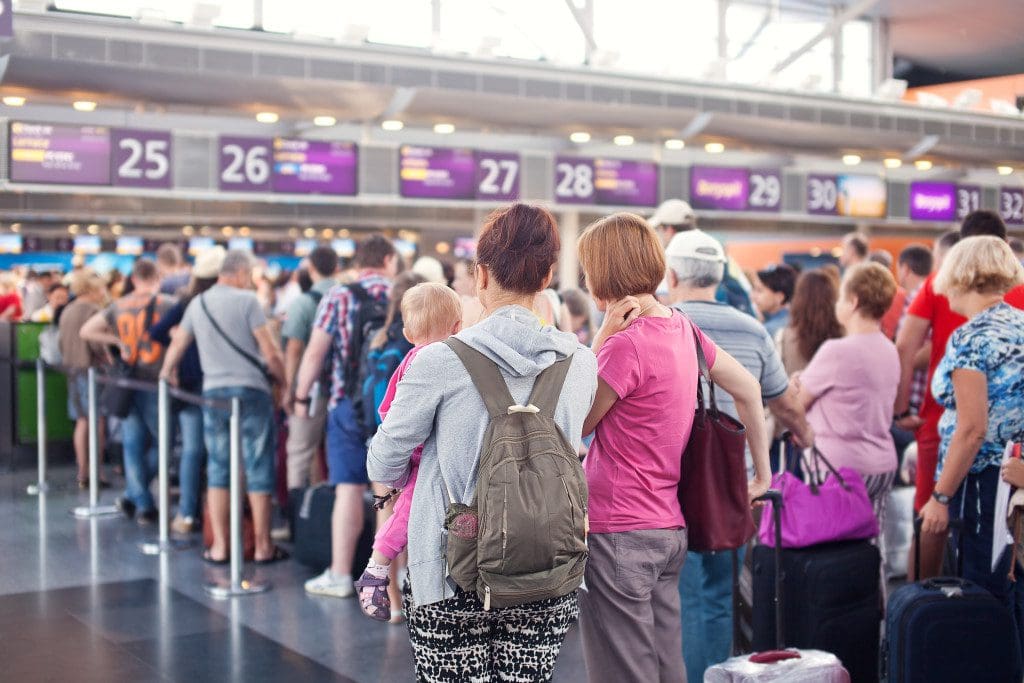
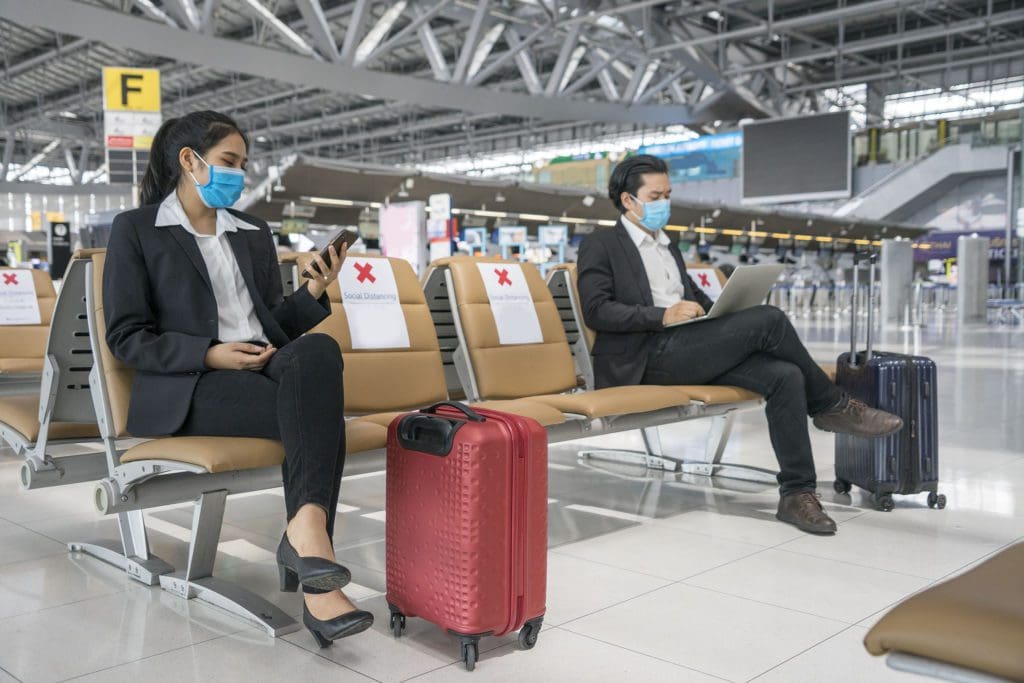

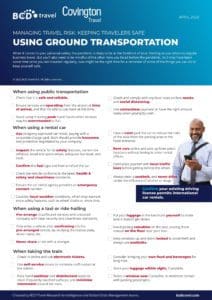
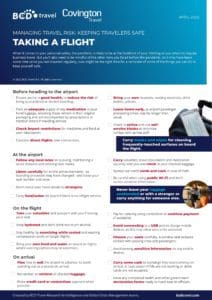
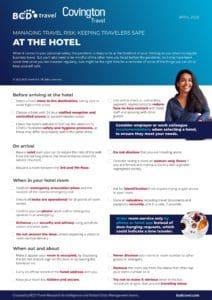
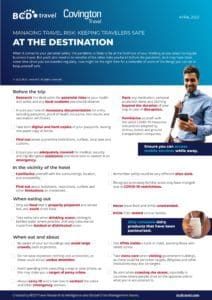
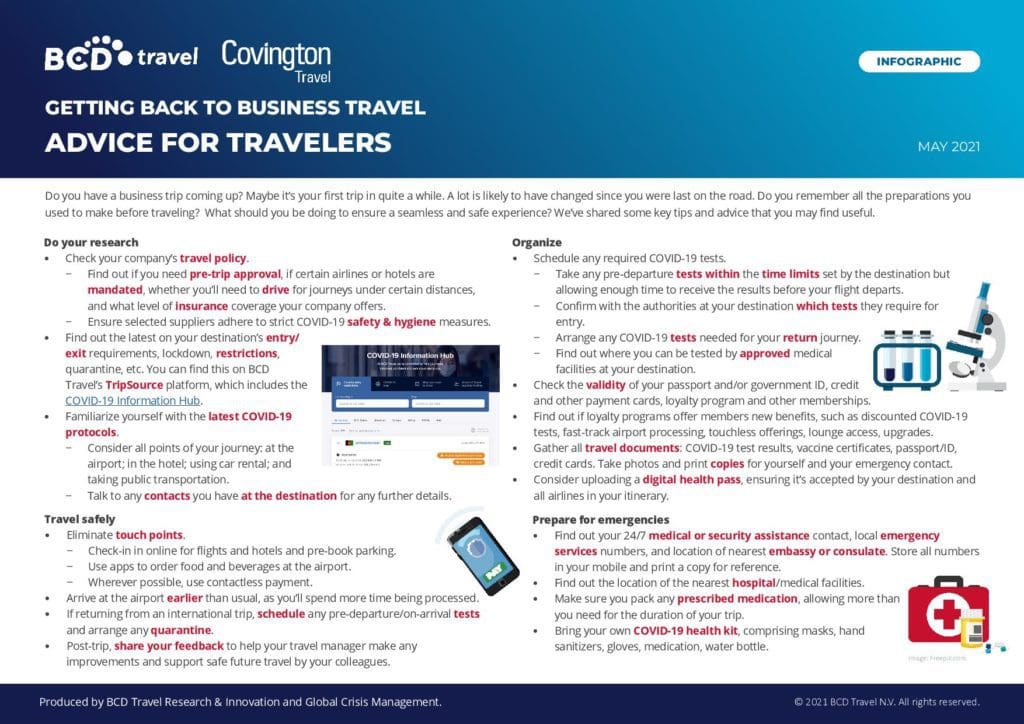
Leave a Reply